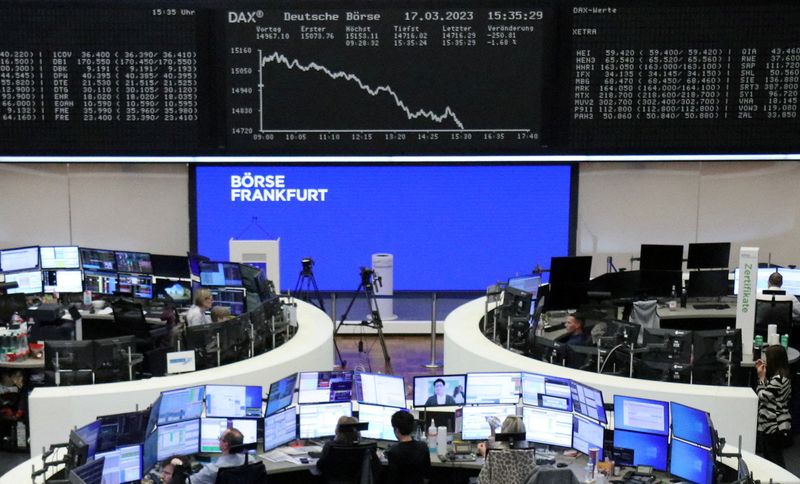By Joice Alves
LONDON (Reuters) - The outlook for European equities isn't pretty as an earnings recession looks likely along with a prolonged period of high interest rates, but investors say much of the bad economic news is priced in and could - in some cases - even provide support.
War in the Middle East has prompted a rush into safe-haven assets, but central bankers' signals that they may not raise interest rates again have pushed the pan-European STOXX 600 index close to three-week highs.
After a long period of scepticism towards European equities, some investors and analysts are finding cause for optimism.
A mix of high interest rates, fraught geopolitics and a weakening economy is not usually favourable for stocks, Jefferies said on Monday. But in the current environment - where surging bond yields have been drawing funds away from equities - it could be that "bad news is good news".
"Any signs of weakness in the economy would lead to lower real yields and help risky assets," strategist Mohit Kumar said.
Deutsche Bank (ETR:DBKGn) is recommending an overweight position, saying weaker growth, earnings misses and a reluctance among central banks to cut rates are largely priced in, "leaving upside potential from positive surprises".
European companies are expected to enter their first earnings recession - two consecutive quarters of falling earnings - since 2020.
In the third quarter, STOXX 600 company earnings are forecast to drop 11.4% year-on-year, after a 5.9% drop in the previous quarter, according to LSEG I/B/E/S, with the quarterly reporting season getting into full swing this week. Earnings growth is only expected to return in the second quarter of 2024.
But European stocks are better priced for a recession than their U.S. counterparts, said Matthew McLennan, co-head of First Eagle’s Global Value team.
"In some ways, the U.S. market is pricing a situation as if we were emerging from recession, and we had a lot of growth ahead, whereas I think the European markets are pricing a more complex reality".
The STOXX 600 trades at 11.6 times forward earnings, compared with 17.8 times for the U.S. S&P 500. The STOXX is up 6% in 2023, versus the S&P's 14% gain.
Goldman Sachs (NYSE:GS), meanwhile, expects positive, but low returns, over the coming 12 months for the European market.
EVEREST PRICED IN
The market has priced in an "Everest" scenario, where a rapid rise in interest rates is followed by an equally fast drop, rather than a "Table Mountain" scenario, where rates flat-line at higher levels, said Oliver Collin, co-head of European equities at Invesco.
That means stocks that are helped by higher interest rates could be trading at a discount relative to the risks, and so have upside potential, he said.
"Equities that benefit from 'Table Mountain' are the same types of equities that benefit from rates going up... for example, banks, financials, insurance companies. And these stocks are trading very, very cheaply because the market is saying 'it's Everest'".
Earnings per share (EPS) forecasts for European banks in 12 months' time are currently at their highest level since 2008, but their shares are 70% below their 2007 peaks, after banking sector turmoil in March rattled investors.
Europe's outperformers, such as some of the chemical ingredients, luxury goods and tech hardware businesses, might struggle because they look expensive, Collin said.
Europe's largest companies by market value - luxury goods maker LVMH (EPA:LVMH) and drugmaker Novo Nordisk (CSE:NOVOb) - trade at 20 and 34 times 12-month EPS forecasts, respectively.
LVMH has already reported slower sales growth in the third quarter.
In the last 50 years, when central banks have stopped hiking rates, European equities have typically tended to rise - when that end has not been followed by an economic recession.
When the end of a tightening cycle has resulted in recession, a correction of 20% or more has followed, BofA data show.
Ayesha Akbar, multi-asset portfolio manager at Fidelity, favours defensive sectors, like healthcare and consumer staples, as "the future looks challenging for European equities ... Rates will likely need to stay restrictive for some time".

First Eagle's McLennan said the weaker euro in part supported the outlook for European equities. The single currency is heading for a third annual drop against the dollar.
"There's some possibility that European equities, by both their valuation and their currency valuation, could do better than U.S. equities over a period of time".